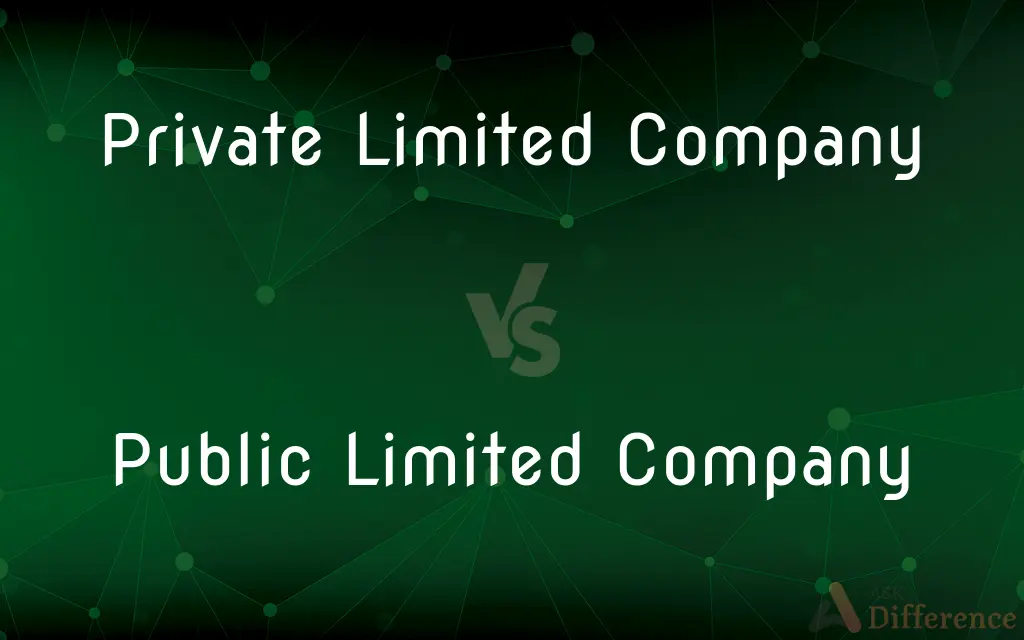Private Limited Company vs. Public Limited Company — What's the Difference?
Edited by Tayyaba Rehman — By Fiza Rafique — Published on December 25, 2023
A Private Limited Company is owned by private shareholders, with shares not traded publicly. A Public Limited Company has publicly traded shares and is subject to stringent regulations.

Difference Between Private Limited Company and Public Limited Company
Table of Contents
ADVERTISEMENT
Key Differences
A Private Limited Company is a type of corporate entity in which ownership is restricted to a certain number of shareholders, and its shares are not available to the general public for purchase. In contrast, a Public Limited Company is one whose shares can be purchased by the public and are traded on a stock exchange.
The ownership structure is a primary difference between a Private Limited Company and a Public Limited Company. While both types can have multiple shareholders, a Private Limited Company typically has fewer shareholders who might be individuals, families, or other businesses. A Public Limited Company, on the other hand, might have thousands or even millions of shareholders from the general public.
Regulations and transparency requirements also set the two apart. Due to their public nature, Public Limited Companies are subject to rigorous regulatory requirements, periodic disclosure of financials, and are under the scrutiny of regulatory bodies. Private Limited Companies, while still regulated, don't face as stringent transparency demands, making their operations comparatively less exposed.
Funding avenues are another point of distinction. Public Limited Companies can raise capital by issuing shares to the public through an initial public offering (IPO), while Private Limited Companies usually rely on private funding sources such as individual investors, venture capitalists, or bank loans.
In terms of liability, both types offer limited liability to their shareholders. However, a Public Limited Company often carries a higher reputation due to its public nature and can therefore attract a broader range of investors and higher capital.
ADVERTISEMENT
Comparison Chart
Ownership
Owned by private shareholders.
Owned by public shareholders.
Shares Trading
Shares are not publicly traded.
Shares are publicly traded on stock exchanges.
Regulatory Oversight
Generally less stringent regulations.
Subject to rigorous regulations and public scrutiny.
Funding Sources
Primarily private funding sources.
Can raise capital via IPOs.
Transparency & Disclosure
Less frequent financial disclosure required.
Regular and detailed financial disclosures mandatory.
Compare with Definitions
Private Limited Company
Company type with shares not available for general public purchase.
The boutique hotel runs as a Private Limited Company.
Public Limited Company
Corporate structure allowing capital raising through IPOs.
The energy conglomerate recently became a Public Limited Company.
Private Limited Company
A firm whose ownership is limited to specific individuals or entities.
The software agency is registered as a Private Limited Company.
Public Limited Company
A corporation with publicly traded shares.
Ford Motor Company is a renowned Public Limited Company.
Private Limited Company
An enterprise with limited liability and private shareholding.
The family-owned vineyard is a well-known Private Limited Company.
Public Limited Company
Company type with regulatory transparency requirements.
Being a Public Limited Company, Amazon discloses its financials regularly.
Private Limited Company
A business structure owned by select private shareholders.
The tech startup transformed into a Private Limited Company last year.
Public Limited Company
An enterprise with limited liability and publicly available shares.
Microsoft's stature as a Public Limited Company attracts many investors.
Private Limited Company
A corporate entity with non-publicly traded shares.
Sarah's bakery operates as a Private Limited Company.
Public Limited Company
A business entity whose shares are available for public purchase.
Google went from a startup to a major Public Limited Company.
Common Curiosities
Are Private Limited Companies free from regulations?
No, they're regulated but face fewer transparency requirements than Public Limited Companies.
What is a Private Limited Company?
A Private Limited Company is a firm with ownership limited to select private shareholders, and its shares aren't publicly traded.
How can a Public Limited Company raise funds?
A Public Limited Company can raise funds by issuing shares to the public via IPOs.
Which company type has more stringent financial disclosure requirements?
Public Limited Companies have more stringent and regular financial disclosure requirements.
Can a Private Limited Company go public?
Yes, through an IPO process, a Private Limited Company can become a Public Limited Company.
How does a Public Limited Company differ from a Private Limited Company?
A Public Limited Company has shares traded publicly, while a Private Limited Company's shares are privately held.
Can anyone buy shares in a Private Limited Company?
No, shares of a Private Limited Company are not available for public purchase.
Why might a firm choose to remain a Private Limited Company?
Privacy, less regulatory scrutiny, or to maintain closer control might influence the decision.
How do ownership structures differ?
Private Limited Companies have specific, private shareholders, while Public Limited Companies have shares available to the general public.
Why might a company go public?
To raise capital, enhance its profile, or provide liquidity to shareholders.
How does public perception differ for both types?
Public Limited Companies often carry a higher reputation due to rigorous regulations and transparency.
Is the management structure different in both types?
While both can have similar management structures, Public Limited Companies face greater shareholder scrutiny.
Are shareholders' liabilities the same in both types?
Both types offer limited liability to shareholders, protecting personal assets.
Which type usually has more shareholders?
Public Limited Companies typically have a larger number of shareholders than Private Limited Companies.
Share Your Discovery

Previous Comparison
Piaget Theories vs. Vygotsky Theories
Next Comparison
Resign vs. Re SignAuthor Spotlight
Written by
Fiza RafiqueFiza Rafique is a skilled content writer at AskDifference.com, where she meticulously refines and enhances written pieces. Drawing from her vast editorial expertise, Fiza ensures clarity, accuracy, and precision in every article. Passionate about language, she continually seeks to elevate the quality of content for readers worldwide.
Edited by
Tayyaba RehmanTayyaba Rehman is a distinguished writer, currently serving as a primary contributor to askdifference.com. As a researcher in semantics and etymology, Tayyaba's passion for the complexity of languages and their distinctions has found a perfect home on the platform. Tayyaba delves into the intricacies of language, distinguishing between commonly confused words and phrases, thereby providing clarity for readers worldwide.














































